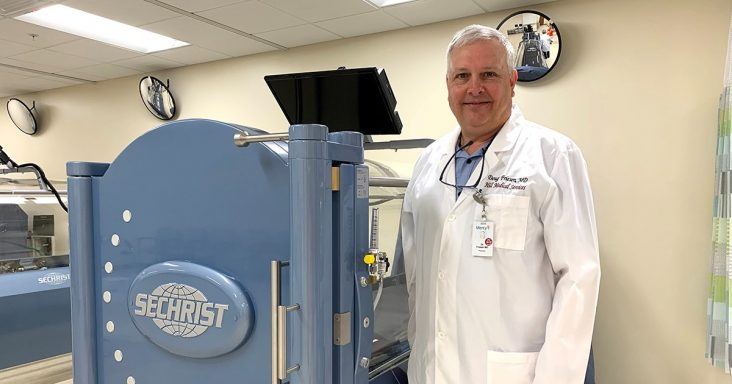Mercy opens expanded wound care center in Rogers
by August 12, 2019 10:10 am 2,049 views

Dr. Doug Friesen
Mercy Hospital Outpatient Services unveiled a new and expanded wound care center on Friday (Aug 9). The new center is in the terrace level of the Mercy Physicians Plaza at 2708 S. Rife Medical Center Lane in Rogers.
Dr. Doug Friesen is the director of the center that specializes in medically approved wound care treatments. They include the use of hyperbaric chambers, which can speed up the healing process of diabetic ulcers and other lower extremity wounds.
Friesen said the new facility roughly doubles the capacity of the treatment and exam space. His team includes two nurse practitioners, about a half dozen nurses with additional office staff. Friesen said the four hyperbaric chambers in the new space are a result of a partnership with Jacksonville, Fla.,-based Healogics who owns and services the machines.
Friesen said the hyperbaric oxygen therapy is commonly used to treat decompression sickness in scuba divers. It also has been proven to work well for serious infections not responding to antibiotics and lower extremity wounds in diabetics that simply won’t heal because of lack of circulation.
Wounds need oxygen to heal properly, Friesen said. In diabetics with poor circulation in the lower extremities, there is a lack of oxygen in the blood. Immersing the patient in a 100% oxygen chamber that is delivered at high pressure, wounds can start to heal over time.
Friesen said patients also have some responsibility for complete healing, but hyperbaric chamber treatments can be a great tool to aid wound healing down in the deep tissue. Other treatments showing promising results are skin grafts using skin from cadavers and/or placenta cells. He said that grafting is done in the office and then hyperbaric oxygen treatments are used to aid in the healing process.
He said the wound care cases his team works on are only those which are Medicare-approved.
The clinic now has a capacity of about 30 in the new expanded space. Friesen said the new clinic offers more convenience for wound care patients that also need cardiology and radiology services as the three outpatient clinics are located in the same building.
Roughly 6.7 million people suffer from chronic, non-healing wounds. Friesen said chronic wounds are more prevalent among the 30.3 million Americans diagnosed with diabetes, who have a 25% chance of developing a foot ulcer. Those who do develop diabetic foot ulcers have a 20-to-30% risk of amputation below the knee.
Healogics reports about 80,000 adults with diabetes undergo a leg or foot amputation due to a non-healing wound each year, 80% of which started with an ulcer. Treating these ulcers early and with the most appropriate wound healing management is key to avoiding amputation.
Increased age, obesity, heart and vascular disease, cancer treatment and traumatic injury may also contribute to non-healing wounds.
